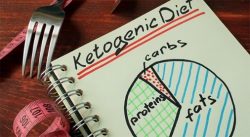Keto and Cancer, What Does the Science Say?
By Louise Hendon
The Truth About cancer
Voorwoord van Voedingtegenkanker.nl :
Dit artikel geeft je veel inzicht, dat er overal over de wereld zeer veel interesse bestaat voor het gebruik van de mogelijkheid van je lichaam in “Ketose te brengen” om hiermee kanker te dwingen dood te gaan.
Ook deze methode is niet het enige middel wat je moet gebruiken om kanker de baas te worden. Het dient vergezeld te gaan door je leefomgeving, je gewoontes, je trauma’s ook aan te pakken. Hiermee ga je naar de oorzaak van de kanker opzoeken en daardoor zal de voedingsbenadering van kanker gaan werken.
Lees daarom dit fantastische stukje en ga ons programma aanschaffen, want die geeft je op al die onderdelen een helpende hand.
Tot zover dit voorwoord.
 The ketogenic diet has been getting lots of positive press recently. And while most of it focuses on weight loss, there’s growing research for using “keto” as a way of preventing/treating cancer.
The ketogenic diet has been getting lots of positive press recently. And while most of it focuses on weight loss, there’s growing research for using “keto” as a way of preventing/treating cancer.
Is there any truth to this?
I’ll go over the evidence currently available so you can make your own informed decision.
And don’t worry… if you haven’t come across the keto diet yet, I’ll also explain what it is, what you eat, and how you can get started if you want to give it a try.
Plus, included are several delicious keto recipes that will help you transition to keto without feeling like you’re missing out.
The Basics: What Is Keto and What Do You Eat?
The main aim of the keto diet is to shift your body’s metabolism so you reach a state called nutritional ketosis.
In nutritional ketosis, your body burns fats for fuel by first breaking them down into a usable form: molecules called ketones.
Normally, your body relies on carbohydrates/sugars as its main source of energy. Switching your metabolism to a fat-burning mode instead has been linked to all sorts of health benefits.
You reach ketosis by changing the way you eat. Specifically, by limiting carbohydrates in order to reduce the amount of sugar in your blood.
So, what do you eat on a keto diet? Very few carbs, a moderate amount of protein, and lots of healthy fats.
Include these foods in your keto diet:
- leafy green vegetables
- cauliflower
- broccoli
- seafood
- eggs
- nuts & seeds
- berries
- avocados
- olives
- coconut oil, lard, and ghee
Avoid these foods:
- processed foods
- vegetable oils
- diet soda
- high carb vegetables
- sugary fruits
- grains
- sugary foods
Here’s the evidence from scientific research on a keto diet and cancer:
#1: A keto diet significantly enhanced the anti-tumor effect of radiation when treating malignant brain tumors in mice.
The mice were fed a commercially available keto-compliant meal substitute (usually given to children with epilepsy). The results were calculated when compared to mice on a standard diet.
The researchers concluded that using the ketogenic meal replacement could be a helpful addition to the current treatment plan, for humans with malignant brain tumors.
#2: A calorie-restricted keto diet is effective for managing brain tumor growth in both animals and humans.
In this study, researchers investigated a calorie restricted keto diet as a potential alternative therapy for brain cancer.
The conclusion? It could play a role in managing brain tumor growth (in both humans and animals).
The diet worked by:
- Reducing inflammation.
- Stopping the cancer cells from creating new arteries to supply themselves with blood and oxygen.
- And restoring the normal body mechanisms which cause damaged cells to die and be replaced with healthy ones.
The researcher’s theory on why the keto diet was effective?
Healthy brain cells have evolved to use ketones for fuel when no glucose is available, but brain tumor cells aren’t as able to use ketones.
And that’s what made the diet effective.
#3: Ketosis stabilizes or causes partial regression of advanced cancer, in some cases.
This was a preliminary study – based only on 10 patients with advanced cancer (of various types). It was carried out to see if a larger study should be conducted in the future.
Researchers were investigating if reducing the amount of insulin the body produces (aka insulin inhibition) could limit cancer growth. When you’re on a low-carb diet, your insulin levels are naturally lower and you go into ketosis.
And so the participants were put on a special insulin-lowering diet for 28 days.
The findings? The patients who experienced ketosis also showed signs of disease stabilization or partial remission.
But more research is needed to see if insulin inhibition could be a good complement to use alongside standard treatments.
#4: Ketone supplementation prolonged the survival of mice with metastatic cancer.
Mice were given a standard diet and also fed one of two types of ketone supplements. Both of these supplements are converted into ketones by the body.
In both cases, the survival of the mice was prolonged. And anticancer effects were seen independently of calorie restriction or glucose levels.
What’s The Conclusion? Does Keto Help With Cancer?
The somatic mutation theory has been the basis of many cancer treatment programs.
But growing evidence that cancer is a mitochondrial metabolic disease may change how researchers and doctors think about how to treat cancer in the future.
Unfortunately, it’s a bit too early to draw any concrete conclusions here, but the studies are promising.
What if You Want to Try Keto?
If you’re thinking of starting a keto diet, below are a few tips to get you started. Of course, you should consult with a health professional first before making any dietary changes as it may affect certain treatments or medications you’re taking.
#1: Clear non-keto treats out of your cupboards and then restock your kitchen with keto-friendly foods to enjoy.
By leaving tempting non-keto foods out of your house completely, you’ll find it a lot easier to stick to the diet!
#2: Pick one meal each day to skip which actually isn’t as hard as it sounds: the keto diet will naturally reduce your appetite (due to its effects on your hunger hormones).
If you only have to think about prepping two meals per day, you’ll find it easier to stay keto. Plus, you’ll get the cancer fighting benefits of intermittent fasting too – more details in this video on the benefits of intermittent fasting for cancer patients.
#3: Boost your ketone levels in the morning by adding half a teaspoon of MCT oil to your diet; you can add it straight to your morning coffee or stir it into a green juice/smoothie. If you need to boost your ketone levels higher, then consider adding exogenous ketones as well.
#4: Learn to cook keto foods by finding simple recipes to get started with (check out the two recipes below).
- A Keto Diet Significantly Enhanced the Anti-tumor Effect of Radiation, When Treating Malignant Brain Tumors in Mice
- A Calorie-restricted Keto Diet is Effective for Managing Brain Tumor Growth in both Animals and Humans
- Ketosis Stabilises or Causes Partial Regression of Advanced Cancer, in Some Cases
- Ketone Supplementation Prolonged the Survival of Mice with Metastatic Cancer
- Somatic Mutation Theory
- Cancer May be a Mitochondrial Metabolic Disease
- Free Keto Meal Plan
